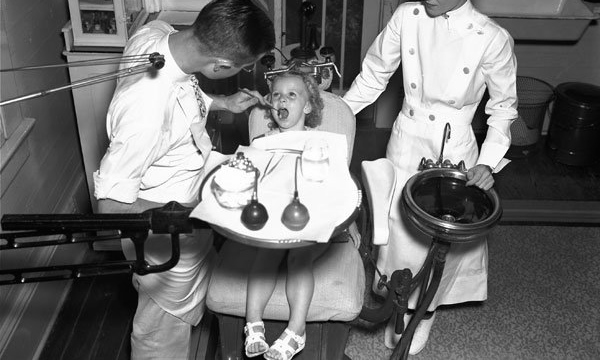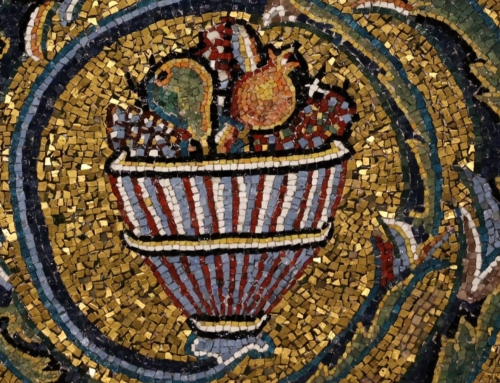Lying in the dentist’s chair last week with all those weird instruments in my mouth got me thinking how similar this experience is to confession. Seriously, they’re basically the same thing. Hear me out.
Both the visit to the dentist’s office and the confessional are rituals typically forced upon one in childhood, neither of which is particularly pleasant—or, at least, I didn’t find either pleasant! Despite the cornucopia of fluoride treatment flavors (Cotton candy? In a dentist’s office? Really?), the barely humorous comics on the ceiling, or the promise of toothbrush color choice at the end, the dentist is still an undesirable break from the daily childhood routine. Why so? Well, simply put, the dentist is always going to find something. You are going to have to admit to hygiene guilt of some form: a broken promise from last visit or just general neglect of tooth care. All that soda and sugar is doing more than making mom tired; it is also creating those dreaded cavities, leading to drills, novocaine, and eating restrictions. Even if there are no cavities (not my general experience), there is always more you can do: Do you brush your teeth after every meal? What about flossing night and day? Are you replacing that toothbrush every three months? Childhood confession has its versions of these: the admission of guilt, the worry about medieval penances, or, worse still, the possibility of having to apologize to your sister. And what about all those lines you have to say? At least in the dentist’s office you can sit in mechanically disrupted silence!
The grown-up versions still track each other, albeit with new features. Dentalwise, sugar sticks are (usually?) replaced with coffee additives, daily flossing still seems doable only for the duty-bound, and that pipe you enjoy once and awhile, well, if you only smoke it that infrequently giving it up entirely shouldn’t be a problem. And about that coffee consumption….The only “good” part about the adult dental experience is that no one is making appointments for you. Which means you tend to wait, and wait, and wait, until that toothache you have had for the last, oh, I don’t know, six months forces your appointment-making hand. Confession, well, once you grow up, the stakes are higher. If only your biggest admission was stealing your sister’s diary. Plus you just never know where the priest might go digging around, what he might turn up during the examination. Maybe that venial sin is connected to a deeply rooted sin that you really struggle to admit to, if you even know it’s there. The whole process can be very uncomfortable, and laughing gas is not an option. And now that your folks aren’t waiting for you to go in the confessional, you can always put it off. So you wait, and wait, and wait, until perhaps you really must go and confess something that could have been stopped well before the penitential root canal you will probably need.
I have been focusing on the less pleasant aspects of each experience. The similarities also extend to the positive effects of each, obviously in different ways. In both cases these effects far, far outweigh the uncomfortability, inconvenience, and even the fear involved. No matter how good a brusher you are, the tools (and hands) they have at the dentist’s office are going to do a better job. Going to confession before any serious sin (let alone afterward!) is wonderful for your spiritual health because of the graces given in the sacrament. Who doesn’t need more grace? The confessional offers tools for growth in grace and virtue that are not available outside the box. Prevention is also important: the dentist and the confessor can see patterns that will lead to serious problems down the road. Believe me, you’re not coming in with anything they haven’t seen before.
None of this happens if you don’t darken the dentist’s or confessor’s door. But given the resistance to each, how does that happen? Positive “preaching.” How many advertisements for a dentist’s office have you heard that use phrases like “No judgment-zone” and “Worry-free dentistry”? In a similar vein, and although certainly not limited to Dominicans, one preaching practice of the sons of St. Dominic is to focus on the virtuous life and its attendant happiness, instead of some pulpit moralizing. As Fr. Peter John Cameron, OP, writes concerning preaching: “Moralism is an attempt to convert people to rectitude according to an ought instead of according to an attraction.” Accentuating the positive instead of dwelling on the negative isn’t just a good business practice, it is also a recipe for staying healthy, naturally and supernaturally. Beautiful smiles are attractive; but even more attractive is a virtuous and happy life.
This isn’t a plug for a dental check-up, but it should be an encouragement to make an appointment with your local confessor, no matter how long since your last visit. Trust in the Lord’s mercy and put aside any fears that might be bothering you. The cleansing of your soul and the gift of grace are invaluable, even if you can’t pick which colors you get.
✠
Image: WPA, Dentist examining child’s teeth. Interior.







